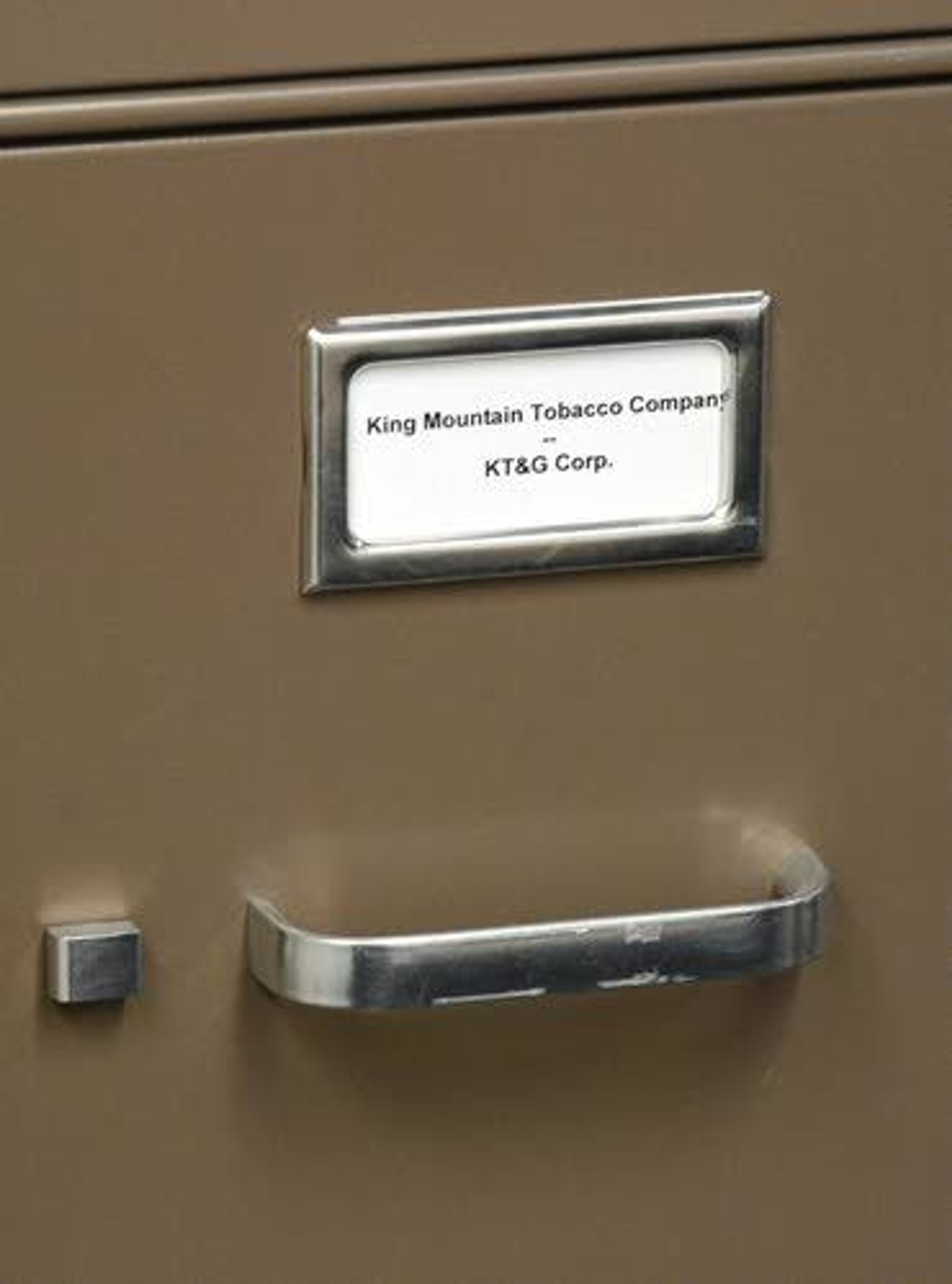Tobacco industry is a hard dragon to slay
Idaho and Washington attorneys continue fight to enforce settlement reached in 1998 with cigarette makers
BOISE - When Brett DeLange started work on tobacco litigation in 1995, cigarette manufacturers were on a 40-year tear, having survived hundreds of individual lawsuits without paying a cent in damages to smokers.
That unblemished record was suddenly threatened, however, when states entered the legal fray.
Led by Mississippi in 1994, states began challenging the industry's marketing practices. They also uncovered evidence that the firms knew their products were harmful, and sought to recoup billions of dollars for the taxpayers who shouldered the resulting health care costs.
To avoid potential bankruptcy, the four largest cigarette manufacturers negotiated settlements, first with Mississippi in 1997, followed by Florida, Texas and Minnesota.
A year later, they settled with the remaining 46 states.
The resulting Master Settlement Agreement is the largest class-action settlement in U.S. history. Dozens of smaller manufacturers eventually joined the agreement. In exchange for immunity from future state claims, the master settlement requires them to stop targeting youth smokers and restricts other advertising practices. The companies must also make annual payments to the states in perpetuity to help offset some of the tobacco-related health care costs.
It looked like the master settlement was the stone that took down Goliath.
Then Goliath got back up.
Idaho, Washington continue fight to force big tobacco to abide by settlement
Almost from the day the agreement was signed, the industry has challenged a portion of the annual payments. To date, more than $11 billion has been funneled into a disputed payments account. Some states agreed to settle for a portion of what they were owed. Others, like Idaho and Washington, invest thousands of man-hours each year and hundreds of thousands of dollars in enforcing the master settlement and protecting their full payments.
"We always knew there would be disagreements," DeLange said. "But I don't think anyone anticipated there would be this level of dispute and litigation."
DeLange began work in Idaho's Office of the Attorney General in 1990. Five years later, then-Attorney General Alan Lance assigned him the task of evaluating whether the state had a case against the tobacco companies.
"At the time, no one had prevailed against them (in lawsuits), but the feeling was that someone needed to hold them accountable," he recalled. "So I started looking at documents."
Most of these were internal company memos and reports discovered during the course of litigation in other states.
"I remember reading some and just getting disheartened," said DeLange, now chief of the attorney general's Consumer Protection Division. "Then I got angry. There were documents talking about the need to capture the 14-year-old market, or saying they knew cigarettes caused cancer so what do they do next. It was clear this wasn't just one bad actor; it was the entire industry."
Idaho's case against the companies was based on consumer protection and anti-trust laws. The state alleged the industry targeted children and misrepresented the health risks of smoking, and that the firms colluded in intentionally not making safer cigarettes.
"We said, 'Had you been truthful, there would have been fewer smokers. And as a state, we're paying a lot in taxes to compensate for the misery you caused,' " DeLange said. "Our legal claims were tied to the impact to the state, not to individuals."
Judge frustrated payment arbitration has taken a dozen years
Total tobacco payments under the master settlement were initially projected to be $206 billion over the first 25 years. Idaho is supposed to get about $700 million of that, while Washington is in line to receive about $4 billion.
Actual payments, however, reflect a variety of factors, including overall sales and inflation. There's also a "non-participating manufacturers adjustment" to account for market share lost to discount cigarette makers who did not sign the master settlement.
The disputed payments are largely tied to this non-participating adjustment, DeLange said.
The tobacco companies say requiring them to pay billions of dollars to the states each year puts them at a competitive disadvantage compared to non-participating manufacturers. They see the non-participating manufacturers adjustment as compensation in the event they lose market share to the discounters.
Idaho and other states, however, say they're under no obligation to protect the companies' market share. They feel the non-participating manufacturers adjustment is only warranted if they fail to hold discounters to the same standards as the participating manufacturers.
States can avoid the adjustment by doing two things, DeLange said. They must enact laws requiring discounters, as a condition of doing business in the state, to pay the same per-cigarette amount they would have paid if they'd signed the master settlement; and they have to "diligently enforce" those statutes.
In 2003, the participating manufacturers set aside more than $1.1 billion in payments, saying states weren't satisfying the diligent enforcement requirement.
It took 10 years to arbitrate that dispute.
This year, arbitration began over another $1.1 billion in disputed payments from 2004.
"Yes, that is not a typo," noted one frustrated Vermont judge in a recent court ruling. "In 2016 we really are struggling with just commencing arbitration over payments nominally due 12 years ago."
Since 2004, the industry has set aside an average of nearly $800 million per year in disputed payments - and each year needs to be arbitrated individually.
It's unclear if this is an intentional strategy to wear down the states, but DeLange noted that some have chosen to settle their disputes. They agreed to give up a portion of the non-participating manufacturers adjustment they otherwise would be entitled to, in exchange for receiving the remainder without a fight.
"For the manufacturers, that was a win," he said. In the 2003 arbitration alone, "they saved hundreds of millions of dollars."
A tobacco industry spokesman, Brian May with Altria, the parent company of Philip Morris USA, declined to comment on the arbitration. However, he noted that manufacturers have settled with 24 states "and we remain open to resolving these disputes with the remaining states."
Idaho and Washington have so far declined to take that path.
"Our AG has said no," DeLange said. "We've done our job, we've kept the bargain (by enforcing the adjustment agreement statutes). This is money we're owed. We don't like litigating, but if we have to we will."
"Why keep wasting money?"
Idaho spent nearly $250,000 defending itself in the 2003 arbitration, not counting the thousands of man-hours invested by the attorney general's office.
Court filings in the case highlight the type of behavior tobacco companies and discounters engaged in to sidestep the intent of the master settlement.
A 2010 statement of claims, for example, noted that at one point nearly three-quarters of the discount cigarettes sold in Idaho came from Star Scientific - yet the cigarettes were actually made by Brown & Williamson, one of the four original master settlement signatories.
"Thus, the growth of what was reported as NPM (non-participating manufacturers) units was fueled in part by the efforts of a (participating manufacturer)," according to the document.
Similarly, a Bahamian discount manufacturer made cigarettes for a particular wholesale firm under license. The wholesaler would do business in Idaho for a year, and then go out of business just before its annual non-participating manufacturers payment was due, stiffing the state for the bill. The same manufacturer would then license the cigarettes to a second wholesaler the next year and repeat the process.
Idaho changed its laws in 2003 to plug that loophole. Consequently, of the 1.72 billion cigarettes sold in the state that year, it was able to collect the required per-cigarette payment on all but 3,000 units, or 15 cartons.
Because of this, the tobacco companies acknowledged they had no case. They didn't even make Idaho go through an arbitration hearing to resolve the 2003 dispute.
"We were no-contested," DeLange said.
Washington also won its 2003 case. Nevertheless, both states must now go through the same exercise to protect their 2004 disputed payments, with millions of dollars at stake in each case.
"We're hoping at some point the companies will see the writing on the wall," DeLange said. "They're spending a lot of money litigating these cases - there were literally hundreds of tobacco attorneys at some of the 2003 hearings. Why keep wasting money?"
Settlement brings 'sea change' in public attitudes toward tobacco and smoking
Partly because of the need to demonstrate "diligent enforcement," cigarettes and other tobacco products are among the most closely tracked goods sold in the United States.
"There might be something more regulated - probably nuclear waste," DeLange said.
The tracking is also related to government funding. Like most states, Idaho and Washington rely heavily on tobacco-related tax revenues (see related information).
This conflict - relying on smokers for funding, while simultaneously collecting from tobacco companies for the harm cigarettes cause - has raised concerns for health advocacy groups, who say states aren't spending enough of the master settlement revenue on tobacco cessation programs.
The process also raises questions of fairness, since the non-participating manufacturers ultimately may not contribute anything toward the public cost of treating tobacco-related illnesses.
Unlike the manufacturers that signed the master settlement, the non-participating manufacturers put all their per-cigarette fees into an escrow account. That provides a pool of money to pay any state claims, should the discounters ever violate state statutes. But as long as they comply with the law they'll eventually get the money back.
"The money stays in escrow for 25 years, to see if they're culpable," DeLange said. "If not, they get the deposit back. We may never collect that money."
To date, states have not sued the non-participating manufacturers to recoup taxpayer funds. In Idaho's case, that's because the state lacks cause.
"Our lawsuit (against the participating manufacturers) was based on wrongful conduct," DeLange said. "But it's legal to sell and smoke cigarettes."
That highlights one important aspect of the master settlement, he said: It wasn't an effort to craft the best public policy regarding cigarettes and tobacco use; it was simply the best solution that could be devised to resolve the multiple lawsuits.
That said, the master settlement still brought about a "sea change" in public attitudes toward tobacco and smoking, DeLange said.
"I think it's done some remarkable good in Idaho," he said. "Youth smoking has dropped dramatically. Tobacco companies agreed to quit sponsoring concerts, they aren't paying to place their product in movies and they aren't advertising on billboards - changes that could not have been made through legislation. Now even the companies admit that cigarettes are addictive and cause cancer. I think (the master settlement) made a wonderful difference for the state."
---
Spence may be contacted at bspence@lmtribune.com or (208) 791-9168.










